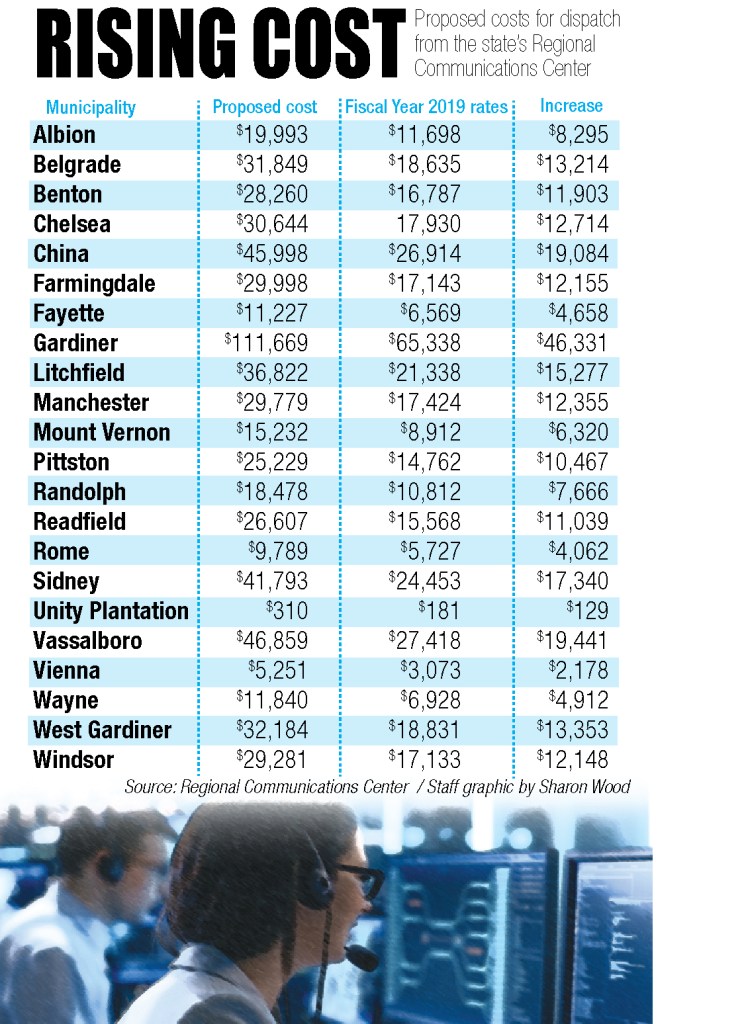Since August, the Department of Public Safety’s director of emergency communications, Cliff Wells, has claimed that the Augusta dispatch center he oversees no longer will be able to accommodate the needs of 22 Kennebec County municipalities after June 30 because of a software change.
Now a different story has emerged.
The state-run communications center allegedly has been underfunded for several years, affecting staffing levels as well as the services it can provide — and to whom it can provide them.
The revelation of this information means that the state-run regional communications center, or RCC, does not need to cut ties with the Kennebec County Sheriff’s Office altogether if the 22 constituent communities pay a collective $265,041 more for law enforcement dispatch next year than they did this fiscal year. The towns would split this expense, as they do currently, based on their call volumes. The money primarily would fund the employment of seven new dispatchers devoted to serving Kennebec County at the state agency.
Albion, Belgrade, Benton, Chelsea, China, Farmingdale, Fayette, Gardiner, Litchfield, Manchester, Mount Vernon, Pittston, Randolph, Readfield, Rome, Sidney, Unity Plantation, Vassalboro, Vienna, Wayne, West Gardiner and Windsor are the affected communities. The county’s other towns and cities contract with various other agencies for law enforcement dispatch. Currently, the 22 affected municipalities pay $373,780 for the state-run Augusta RCC to dispatch law enforcement; and under a Jan. 14 proposal from Wells, they would pay a total of $638,821.
Sheriff Ken Mason said he found out that the regional communications center was underfunded in a conversation with Wells in late December, after he already had informed the municipalities that switching dispatch services to the Augusta Police Department would be the “most fiscally responsible” move.
“Had (Wells told me) that back in August, I wouldn’t have done all this work going to Augusta to find my solution,” Mason said. “I would have taken that quote and used that to go forward with the towns and say, ‘Look, this is what they’re asking to keep us all together moving forward.’ … We’re kind of back at square one.”

Regional Communications Center dispatcher Adam Zibura handles a call on the phone, radio and computer Tuesday in Augusta.
While the associated cost increase of staying at the state-run RCC is not ideal for any of the involved municipalities, the price of law enforcement dispatch was going to increase in the coming year no matter what — and the costs of any alternative option may be worse, especially for Gardiner.
Kennebec County municipalities would pay $367,390 altogether — $59,497 more than they currently pay the RCC — to dispatch from the Augusta police. However, Augusta would be unable to serve Gardiner, which constitutes 40 percent of the county’s call volume.
“The Augusta proposal is great for the Kennebec (County) Sheriff’s Office and 21 towns,” he said at a Kennebec County Commissioners’ meeting last week. “It’s not great for Gardiner. … They’re being hung up to dry.”
Even the towns that the Augusta police could serve weren’t all pleased with the option, which many felt concealed associated costs. Augusta police does not serve as a public safety answering point (PSAP), which would require the 21 eligible towns to contract elsewhere for people to answer their residents’ 911 calls, an annual expense that can range from about $1,300 to upward of $10,000 per town. Those municipalities also would have a period of three to five years to finance purchases of digital radios, which are needed to be able to communicate with the Augusta police dispatch system. Digital mobile radios cost about $1,400 each, and digital portables cost roughly $1,200 apiece, according to a quote assembled by Vassalboro firefighter Mike Vashon.
If the current arrangement with the state-run RCC were disbanded, Gardiner would face a bill of at least $300,000 to either purchase the software program needed to stay with the RCC or finance the salaries of its own dispatchers to work in the old system — and then pay for the actual dispatch service on top of that. If the entire county stays with the regional communication center, Gardiner could pay nearly a third of that cost.
Last week at a Kennebec County commissioners’ meeting, Gardiner police Chief James Toman proposed that the city pay the RCC more than the rate proportional to its call volume in order to offset some of the price increases for the other towns. City Manager Christine Landes said Gardiner would pay up to $185,000 — accounting for about $120,000 of the county’s $265,041 increase. Landes said the RCC would need to provide a five-year commitment to not increase fees and maintain enough employees to handle Gardiner’s call volume.

Gardiner police Officer Marcus Niedner reviews a complaint he was dispatched to Thursday inside his cruiser in Gardiner. Police can review their calls and update them with notes on the computer.
“The city of Gardiner is open to paying more so that everybody can stay there, so that we would have seven dispatchers paid for by the county — the 22 towns,” Toman said.
On Thursday, Feb. 14, the municipalities, Mason, Wells and the Kennebec County commissioners will meet to discuss the new option of staying at the RCC as well as Gardiner’s idea to subsidize the dispatching expenses for the other affected municipalities.
Mason said that a decision needs to be made by March, because if the county goes with the Augusta Police Department, it needs four months to hire and train four new staff members. Augusta’s City Council also would need to approve its Police Department as the vendor for the county’s dispatch needs.
The sheriff was unable to provide written documentation that the state-run regional communications center has been underfunded for over a year and recalled the information being relayed to him orally. Toman said he heard the news from Mason, not directly from Wells.
“I don’t remember how it came about,” Mason said. “I emailed (Wells), asked to sit down and talk to him in late December (and) he said it was funding issues, that they had been underfunded for years. … They just hadn’t been paid enough by the towns.”
The RCC does not receive money from the state budget, but is funded entirely by the communities and clients that use its services. In addition to serving the Kennebec County Sheriff’s Office, the Augusta center also currently serves seven state law enforcement agencies and four municipal police departments, according to Wells. It offers fire and rescue dispatch — separate from law enforcement dispatch — to Chelsea, Litchfield, Vassalboro and Windsor. The RCC can continue to provide fire and rescue dispatch to these towns regardless of who they choose to dispatch their law enforcement.
Wells did not respond to multiple attempts to contact him Friday, Monday and Tuesday. The newly confirmed Public Safety Commissioner Michael Sauschuck was out of the office on Tuesday for vacation.

Regional Communications Center dispatcher Adam Zibura handles a call on the phone, radio and computer Tuesday in Augusta.
PERSISTENT FRUSTRATION
Wells’ decision to cut ties with the sheriff’s office has caused stress and confusion for the 22 contracting communities since the summertime. In August, Wells informed Mason and municipal officials that the regional communications center would stop dispatching for the sheriff’s office after June 30, leaving the 22 communities uncertain as to who would answer their 911 calls and send law enforcement officials to the scenes of emergencies.
Mason had long been unhappy with the way the state’s software interfaced with the system the county — and much of the rest of the state — uses, IMC. In the summer, Mason began investigating the costs associated with switching to other dispatching agencies that use IMC. At the same time, Wells was making a system upgrade to the state-run RCC. When he heard Mason was considering seeking alternate dispatch options, Wells said he was unwilling to spend $350,000 to build a new interface between the state’s new software and IMC, if he could not even guarantee that Kennebec County would stay with the agency. He also noted that programmers couldn’t build that interface for at least two years anyway.
“It was a business decision,” Wells told county commissioners last week.

Gardiner police Officer Marcus Niedner wears an earpiece and microphone to respond to radio calls Thursday.
Mason spent several months this fall meeting with municipal officials to present the idea of contracting with the Augusta police come July 1. Now he may have to repeat the process with Wells’ new option.
“I’m going to move forward to find a solution with everyone that is the most fiscally responsible way to go,” Mason said.
He noted that he has been unable to determine why Wells did not make it known to him earlier that the county could stay with the state-run communications center if it paid a higher fee.
“Why they didn’t tell us that wasn’t an option at the beginning, I don’t know,” Toman echoed.
Mason said he has also had difficulty getting answers about how the RCC became underfunded in the first place.
“I have that question in to Commissioner Sauschuck,” Mason said, referring to the newly confirmed public safety commissioner.

Gardiner police Officer Marcus Niedner replaces a microphone on his radio Thursday in his cruiser after a call in Gardiner.
A staffing shortage at the Augusta regional communications center was reported as early as July 2018. At that point, the 14 out of 35 dispatcher positions were filled. The state’s Department of Public Safety determined that 15 dispatchers was the minimum number that should be working at the center each day. Wells told the Morning Sentinel in November that “we’ve got a number of positions filled already, some in training and a couple more going through background,” but did not provide an exact number of employees working at the RCC at that time. It is unclear how many dispatchers are employed currently at the state-run communications center in Augusta.
In the fall, the director of the Vassalboro First Responder Service, Dan Mayotte, said he has observed poor interfacing between the state-run RCC’s software and IMC causing a number of errors and delays to emergency responses.
The overall situation has left a bad taste in Mason’s mouth about how dispatching works throughout the state of Maine.
“Do we go back to the state who has total control?” he said. “Who’s to say they’re not going to make changes in two years? What’s more cost-effective? Do we open our own dispatch center, just to service those that we serve now? Because I certainly don’t want to be in competition with other towns. I just want a solution for Gardiner and Kennebec right now and the four towns (that dispatch fire and rescue through the Augusta RCC).”
Mason was not alone in this sentiment. At the commissioners’ meeting last week, Gardiner’s mayor, Patricia Hart, asked whether the problem could be addressed in the Legislature. Rep. Dick Bradstreet, R-Vassalboro, said he thought that receiving state funding for the current situation was unlikely. Sen. Matthew Pouliot, R-Augusta, said he would be interested in working on related legislation in the future.
Thursday’s meeting is scheduled for 10 a.m. at the Hill House in Augusta, located at 125 State St.
Meg Robbins — 861-9239
Twitter: @megrobbins
Copy the Story LinkSend questions/comments to the editors.









Success. Please wait for the page to reload. If the page does not reload within 5 seconds, please refresh the page.
Enter your email and password to access comments.
Hi, to comment on stories you must . This profile is in addition to your subscription and website login.
Already have a commenting profile? .
Invalid username/password.
Please check your email to confirm and complete your registration.
Only subscribers are eligible to post comments. Please subscribe or login first for digital access. Here’s why.
Use the form below to reset your password. When you've submitted your account email, we will send an email with a reset code.